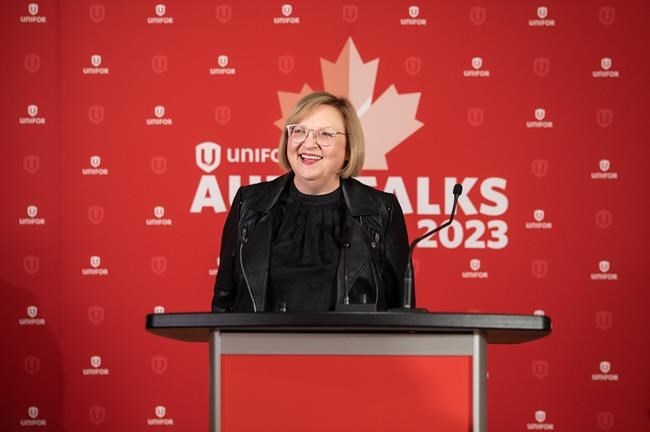TORONTO — Unifor put a short-lived strike on hold Tuesday after General Motors agreed to a tentative contract that mirrors the one the union reached with Ford Motor Co. about two weeks ago.
Close to 4,300 autoworkers at GM's Oshawa assembly plant, St. Catharines propulsion plant, and Woodstock parts distribution centre had gone on strike at midnight after the company resisted the terms set out in the Ford deal.
About twelve hours later though the company had relented, including on key sticking points like pensions, retiree income supports and converting full-time temporary workers into permanent employees.
"Sometimes you have to take these tactics, sometimes we have to exercise our right to strike in order to get the kind of collective agreement that our members deserve," said Unifor president Lana Payne at a press conference in Toronto.
Workers at the three operations were expected to go back to work Tuesday afternoon, while Unifor said ratification votes would be scheduled in the coming days.
The terms of the three-year contract include base hourly wage increases of nearly 20 per cent for production and 25 per cent for skilled trades (when compounded), a faster timeline for workers to reach the top wage tier, improvements to pensions and two new paid holidays among other gains.
Payne said the deal will be life-changing, especially for the recent hires and temporary workers at GM, a prospect that made reaching a deal a challenge.
"We knew that getting this pattern was going to be an uphill battle because of the economic significance of the Ford agreement."
General Motors Canada president Marissa West said the deal includes significant increases in wages, benefits and job security.
"This record agreement, subject to member ratification, recognizes the many contributions of our represented team members," she said in a press release.
Both the move away from temporary part-time workers, and the improved pensions, are significant cost items for GM, said Stephanie Ross, an associate professor of Labour Studies at McMaster University.
"Companies see better pensions as a cost for many years to come," she said by email.
Industry analyst Sam Fiorani said GM has more senior-level workers than Ford so the terms are more expensive for it to meet.
"Their older workers are already getting good benefits, and to up their benefits even more would cost GM a lot of money relative to the workforce they have."
Fiorani, vice-president of global vehicle forecasting at AutoForecast Solutions, said that GM had the resources to hold out for some time since it has several other plants producing the pickup trucks being made in Oshawa, but that it would have been costly for the automaker.
"Every lost Silverado and Silverado HD unit is worth tens of thousands of dollars of profit ... every lost unit is felt on the bottom line."
Unifor workers at Ford overall voted 54 per cent in favour of the deal, though skilled trades members in Windsor and Oakville voted down the deal.
If GM members vote in favour of the contract, Unifor would then turn its attention to reaching the same terms with Stellantis.
The company, with more than 8,000 employees, two assembly plants and a casting plant, has a larger footprint than either Ford or GM and Payne is expecting more tough negotiations ahead.
"I expect Stellantis will come here kicking and screaming the same way that General Motors did."
This report by The Canadian Press was first published Oct. 10, 2023.
Ian Bickis, The Canadian Press

